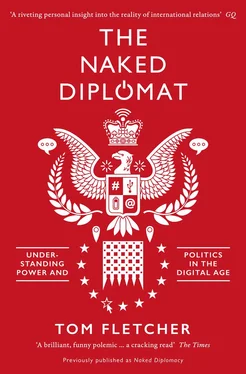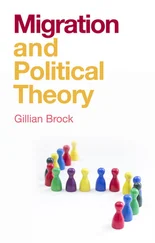Secondly, the apparently friendly states, such as great power allies, who were nevertheless competing to get a bigger slice of the cake. For the UK, Europe has fallen into this category since the Second World War. We have vastly similar values and objectives, yet still contest resources and influence, and argue over the decisions where we need to pool sovereignty. Je t’aime, moi non plus .
Third, the local rivals for authority and influence – in the case of many ministries of foreign affairs, this was usually the Treasury or the prime minister’s office.
No country faces permanent enemies or can count on permanent allies. The first, most hostile, group are now more likely to be transnational, non-traditional actors – terrorists, renegade states or information anarchists. This could be the throat cutters and concert bombers of the self-proclaimed Islamic State, the despots in North Korea, Syria and Zimbabwe, or Julian Assange.
The apparently friendly second group are now more likely to be those competing for business or security influence, including the media, NGOs and multinationals. They will be the disruptors – think tanks, big data analysts, social media gurus – who are replacing diplomats in their ability to analyse or shape foreign policy. A proliferation of organisations now compete with diplomats by selling geopolitical analysis. The best are the Brookings Institution, Chatham House and Carnegie. 4Or the service providers who are moving ahead so fast with the way they respond to customer needs that they make government efforts – passports, visas, commercial introductions – look hopeless. I’d also include the new technology companies, with whom governments will increasingly contest key ground.
The local contenders are probably still the Treasury.
Diplomats need to understand those groups of rivals, the tools available to them, and why and how they are deploying them. They need to use social media more effectively than terrorists. They need to understand JPMorgan Chase or Google’s diplomatic machinery in the way that they understand China’s. They should be competing with the best technology they can lay their hands on. They should be on a digital war footing.
I often ask people who they think will have the greatest influence on the twenty-first century – Google or Britain? Increasingly, most say Google. I want to show in this book how they can be proved wrong. Google has been a technological superpower for a decade. Britain has been one for at least 250 years.
There will be many times when digital media feel to professional diplomats an obstacle to traditional diplomacy. We saw over the August 2013 debate on whether to strike Assad for using chemical weapons the way that digital debate makes it harder to play diplomatic poker, with the UK and subsequently US positions shifted as a result of online and offline disagreement. Governments are already much more restrained than a century ago, particularly when it comes to going to war. That is a good thing, but it makes it harder to make the threats necessary to stop our opponents taking territory or killing civilians. Our bluff is too easily called.
New digital media will also create different and sometimes uncomfortable oversight of what diplomats do, including the difficult compromises made in the heat of a negotiation. That’s good. But they will further empower rival sources of influence and power. Digital media will make it harder to gain the consent of those whom diplomats claim to represent, and easier to lose it.
To gain the trust needed to avoid extinction, diplomats will need humility as to the limits of their authority, and a readiness to be more accountable to and more representative of the populations for whom they work.
Technology and society are being transformed, with or without diplomats. This presents threats as well as opportunities. But so did the printing press, the telephone, air travel. Now that anyone can be a diplomat, we have to show that you can’t live without diplomats. When I became an ambassador at the age of thirty-six, some people asked me if I was too young to do the job. Looking at the way the region (and the world) was changing, I sometimes wonder if I was too old.
Yet we still need experts who can really understand the countries with which we are dealing, people who can help us to respond to global changes, to see where the next opportunities are, and from where the next challenges will come. Diplomats, if they are doing their jobs well, are an essential part of that. Technology should enhance rather than diminish that role.
The third argument against traditional diplomacy is that diplomats are not proving to be very good at it.
In this narrative, diplomats lack the skills and resources to put in the hard hours and tough negotiations that are needed to do real diplomacy. America’s inwardness, increased popular and media oversight, and Western public revulsion at military engagement make it harder still.
Diplomacy has always struggled to keep up with events. It has woefully failed to reform the international system it inherited after the Second World War. There has been a lack of collective international graft and realism in fixing some of today’s major conflicts, not least Syria and Israel/Palestine, both abject failures of the UN Security Council.
But for every diplomatic failure – the 2009 Copenhagen climate change summit, the Middle East Peace Process – there are successes such as the Iran nuclear deal or the Dayton peace accords. It is in the nature of diplomacy, an effort to deal with an unpredictable and complex world, that diplomats won’t always get it right. It is not a reason not to keep trying.
There is a pivotal moment in David Puttnam’s brilliant 1981 film Chariots of Fire when sprinter Harold Abrahams is reprimanded, in a typically understated but caustic upper-class English way, by the Master of Trinity College. His crime? Having employed a professional coach to prepare for the 1924 Olympics. The fiercely ambitious Abrahams is having none of this amateurishness. ‘I believe in the pursuit of excellence. And I will carry the future with me.’ He storms out, storms the race, and wins Olympic gold.
Political life, including diplomacy, faces a similar moment. There is a thirst for authenticity and authentic leaders. People feel disconnected from politics, authority, governments and decision-making. We are in an era of distrust, disconnection and detachment. Diplomacy finds itself ill-equipped for this new context. And it faces greater competition than ever before. Like many industries based on institutional authority, diplomacy insufficiently reflects the realities of a world in which the balance of power between citizens, business and government is shifting from hierarchies to networks. It too often prioritises pumping out a message over changing society. 5Much of its procedural method – summits and communiqués – was designed in 1815 for an age of monarchies and great states.
There is little that you cannot learn about government from the British sitcoms Yes, Minister and Yes, Prime Minister . In one episode, senior civil servant Sir Humphrey Appleby is asked by his prime minister how they should react to a bellicose speech by a foreign leader. ‘In practical terms we have the usual six options,’ replies Sir Humphrey. ‘One: do nothing. Two: issue a statement deploring the scene. Three: launch an official protest. Four: cut off aid. Five: break off diplomatic relations. And six: declare war.’ So what to do? ‘Well if we do nothing we implicitly agree with the speech. Two, if we issue a statement we just look foolish. Three, if we lodge a protest it will be ignored. Four, we can’t cut off aid because we don’t give them any. Five, if we break off diplomatic relations we can’t negotiate the oil contracts. And six, if we declare war it might just look as if we’re overreacting.’ In one exchange, Sir Humphrey punctures the utter futility of much modern diplomatic communication, and captures why so many people are simply zoning out of political discourse.
Читать дальше












